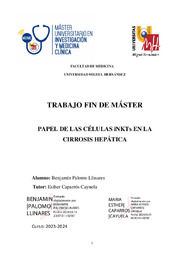Abstract:
Las consecuencias hemodinámicas de la translocación bacteriana (BT) en la enfermedad hepática crónica avanzada son conocidos. La BT desencadena la activación del sistema inmunológico y conduce a una respuesta inflamatoria sostenida. Las citoquinas proinflamatorias promueven un empeoramiento de las alteraciones hemodinámicas durante la cirrosis, especialmente a nivel hepático, cardiovascular y renal. La contribución de las iNKTs a la enfermedad hepática crónica sigue siendo en parte desconocida.
Hipótesis
La activación mediada por CD1d de las células T natural killer tipo I (iNKTs) con antígenos de glicolípidos de bacterias intestinales predice un aumento del gasto cardíaco y un mal pronóstico en pacientes con enfermedad hepática crónica avanzada.
Objetivos
Objetivo principal: Caracterizar los niveles de iNKTs en sangre periférica de pacientes con cirrosis, detectar porcentaje de iNKTs circulantes y subtipos (iNKT1, iNKT2, iNKT10, iNKT17). así como de citoquinas secretadas por diferentes subtipos de iNKTs, entre ellos IFN-ɣ, IL-4, IL-10, IL-17.
Objetivos secundarios: Detectar traslocación bacteriana (BT) en suero y subdividir pacientes según BT+/BT-. Además, comprobar si hay diferencias estadísticamente significativas entre el número de iNKTs en los pacientes cirróticos BT- respecto a los BT+ y evaluar el perfil de microbiota intestinal.
Metodología
El estudio es un estudio experimental en el cual utilizaremos las muestras de sangre completa de pacientes con cirrosis pertenecientes al área de salud del Hospital General de Alicante, y mediante citometría de flujo estudiaremos la abundancia de cada subtipo de iNKTs. En estas muestras evaluaremos los niveles de citoquinas secretadas mediante ELISA (IFN-ɣ, IL-4, IL-10, IL-17). Los análisis estadísticos se realizarán con el software de bioestadística R.
The hemodynamic consequences of bacterial translocation (BT) in advanced chronic liver disease are examined, and knowed. BT triggers the activation of the immune system and leads to a sustained inflammatory response. Proinflammatory cytokines exacerbate hemodynamic alterations in cirrhosis, especially at the hepatic, cardiovascular, and renal levels. The contribution of type I natural killer T cells (iNKTs) to chronic liver disease remains unknown.
Hypothesis
CD1d-mediated activation of type I natural killer T cells (iNKTs) with glycolipid antigens from intestinal bacteria predicts increased cardiac output and poor prognosis in patients with advanced chronic liver disease.
Objectives
Main Objective: To characterize iNKT levels in peripheral blood of cirrhotic patients. Detect circulating iNKTs and their subtypes (iNKT1, iNKT2, iNKT10, iNKT17). Analyze proinflammatory cytokines secreted by different iNKT subtypes: IFN-ɣ, IL-4, IL-10, IL-17. Secondary Objectives: Detect bacterial translocation (BT) in serum and subgroup patients according to BT+/BT-. Determine if there are statistically significant differences in the number of iNKTs in BT- cirrhotic patients compared to BT+. Do they have fewer iNKTs? Do they present a different microbiota or immunological profile?
Methodology
An experimental study will be conducted using whole blood samples from cirrhotic patients at the Hospital General de Alicante. The abundance of each iNKT subtype will be analyzed using flow cytometry, and proinflammatory cytokines secreted will be analyzed using ELISA (IFN-ɣ, IL-4, IL-10, IL-17). Statistical analyses will be performed using the R bioinformatics software.
|

.png)
